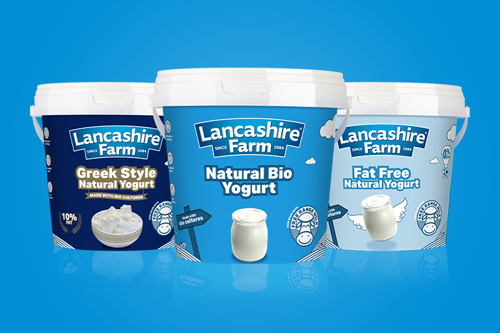With support from the Hub beginning with a major rebrand in 2015, Rochdale-based Lancashire Farm has grown its staff count to 220+ and turnover from £10 million to £50 million in just over a decade.
52.5
tonnes of CO2e saved
£ 11,637,564
sales increase
£6,569
in resource efficiency cost savings
Pakeeza is the only UK yoghurt manufacturer to commit to using free range products. Its leading brand, Lancashire Farm, is also the UK’s third most popular choice of natural yoghurt, and it’s evident that the team at Pakeeza are not only proud of the product they make but are keen to drive increased animal welfare standards.
Over the past ten years, Pakeeza has re-invested heavily into its business operations, with its employee headcount growing tenfold to 220+ and turnover growing from £10 million to £50 million following a major rebrand that has led to a significant growth in sales.
Since 2015, GC Business Growth Hub has helped Pakeeza to redefine the Lancashire Farm brand and to make some important decisions and investments concerning energy usage, automated processes and future growth plans.
Here we speak with Pakeeza’s Chief Operating Officer Sarfaraz Akram (SA) and Commercial Manager Jack Morrison (JM) to find out more about their recent journey and how the Hub has helped.
Hi Sarfaraz and Jack. Please tell us a little about your business - what is it and how was it founded?
SA: We were founded in 1984 and originally the company was run by father and son, Ghulam Zouq and Azhar Zouq. Ghulam sadly passed away in 2021 and Azhar continues to lead the business as Managing Director. Ghulam had left Pakistan for England in 1960 and originally worked in Lancashire’s textile mills, before setting up a fruit and veg stall in Rochdale in the early 1980s. He started as a market trader, buying and selling yoghurt, which became a speciality before he transformed the business to begin manufacturing its own yoghurt.
Over the decades this has got bigger and bigger to the point where the company has grown its turnover from £10 million to £50 million in just the last ten years. Our core discipline is manufacturing cultured dairy and natural yoghurt under the main brand, Lancashire Farm. The business also manufactures a range of other brands, including Henna, Desi and Pakeeza.

HiSarfaraz Akram, Chief Operating Officer
Lancashire Farm Dairies
Today we’re stocked and sold by Sainsbury’s Tesco, Asda, Morrison’s, Coop, Iceland, and many others. We also do some private label products where we make and sell the products of other food manufacturers. We also supply wholesale formats too, with bigger 5kg and 10kg buckets manufactured for the catering market.

When and why did you first make contact with GC Business Growth Hub?
JM: In 2015 the business had reached a milestone and was ready for change. We wanted to grow the business further – as always, the team has a relentless energy and drive that goes into making improvements, moving into more markets and improving our distribution. We worked with the Hub on a couple of projects centred on the brand and how it could be improved. The Hub helped to make the rebranding project more palatable to the business. At that point in time, it was a huge decision to make a change to the brand – the company had been doing something well for decades and naturally that felt very safe and familiar.
However, we saw an opportunity to reposition Lancashire Farm in the market. The by-product of investing and improving the brand would make us more desirable to customers and retailers, while driving more volume and throughput, creating more jobs.
Our instincts proved right and the rebrand, which kept the name but changed the look and feel of the Lancashire Farm products, has helped to push the envelope and has been a raving success. We’re seeing continued sustained growth as a result and the team at GC Business Growth Hub have been hugely supportive and integral to this, pointing us to the right sources of support, helping with our manufacturing funding challenges and bringing in experts to collaborate and help the business grow.
Over the last few years, we’ve focussed more and more on our operations too and, working with Hub, we’ve looked into areas such as energy usage and preservation on-site, and automation with some funding secured from the Made Smarter programme to enable us to automate some production lines. The Hub have been constantly in contact during this process, they’re a real asset and enabler behind a lot of the recent growth that we’ve experienced.
How else has support from the Hub helped you?
JM: The Hub’s support has been across three main areas: the rebrand and brand consultancy (following an introduction to the Manufacturing Advisory Service, MAS, and its digital team); energy resource guidance and support; and assistance with our automation and modern manufacturing techniques.
With these areas, as with any business issues, it’s always an option to wait and debate and to hold back on a prospective change. The input from the Hub – however they’ve supported across each strand – has really helped to make these projects a reality.
SA: The palletisation robot funding we received is a good example of this. The funding we secured with the Hub’s support was £20k against a project value of £150k. Without that support we would not have gone ahead with the project at all and the project overall has been a raving success. We’re really pleased with its output. It showed us the application of that function and we’ve gone on to roll out further automation in the business.
Working with the Hub has made approaching change less daunting and more palatable. Their support has encouraged us to look at more automation on site, and that little nudge can sometimes set us on a different path. The improved brand consultancy and energy resource guidance has really contributed to our growth as a result.
JM: Generally, the Hub will always try to point you to the relevant specialists whether that’s within their own network or within the local government and council departments who can help you. Their focus is about trying to deliver solutions to make things better. They’re there to help you grease the wheels and get things moving.
Working with the Hub has made approaching change less daunting and more palatable. Their support has encouraged us to look at more automation on site, and that little nudge can sometimes set us on a different path. The improved brand consultancy and energy resource guidance has really contributed to our growth as a result.

How has working with the Hub made a difference to your business?
How has working with the Hub made a difference to your business?
JM: Since 2015, they’ve helped us to rebrand and to effectively deliver more distribution into retailers, enabling us to expand the product range. The values of sales for the brand were around £7 to 8 million and they’re now at around £19 million. The output from the rebrand has driven value sales and distribution – it’s a fantastic result and the Hub share a massive part in that.
SA: In terms of the automation that we now have with our palletising and end of line processes, it’s allowed us to deliver a significant amount of volume through the plant that we would have been unable to achieve before. It’s definitely contributed to growth and to our overall cost base.
Employment in the business is still really positive because we’re growing, but we’ve also stabilised our costs which means we can invest in higher skilled resource and make sure that our payroll costs are balanced.
From an energy perspective, the Hub has helped us to better understand the technical detail behind our energy inputs and outputs and how we optimise it. We have big some big energy uses on the site so a seemingly small saving here or there can make a huge material difference.
Based on your experience with the Hub, what advice can you offer to other entrepreneurs and business owners?
JM: First and foremost, it’s all about improving your engagement with the local area – whether you’re a sole trader, small, large, whatever size business you are. Look to make an introduction if you haven’t already and build a relationship with the Hub, they will find a way to support you. Fundamentally you won’t know what support they can offer until you’ve spoken. Even if it’s just for them to lend an ear and signpost various resources and tools for your business.
SA: When you’ve got the day job to do first and foremost and then you’re starting on a major project, it’s invaluable being able to pick up the phone to a genuine source of support. The Hub brings additional resource to help you go to the relevant people and access the right guidance - it’s all a massive help.
Tell us about your business and we’ll find the right advisor and service for your needs. Whether you want to grow your bottom line, find partners or join a community of peers, we’re here to provide specialist support and guidance.
Get in touch
Please contact us at 0161 3593050 or query below.
Take that first step and we’ll support you with whatever you need to succeed.
Sign-up to our newsletter
Insights, news, events and opportunities straight to your inbox.